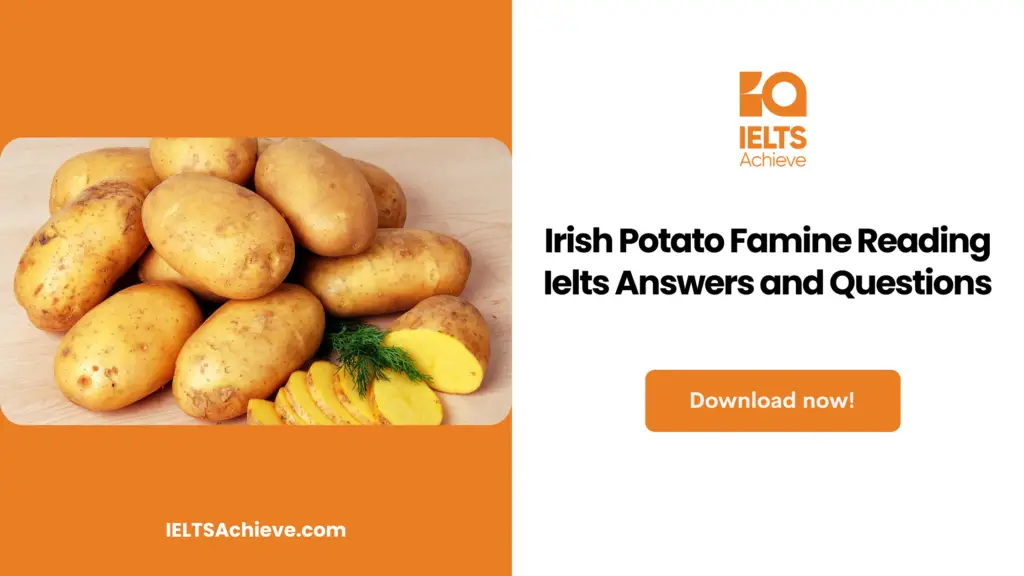The Blog post contains the following IELTS Reading Questions:
- IELTS Reading Matching Headings Questions
- IELTS Reading Matching Sentence Ending Questions
- IELTS Reading Summary completion
Stay informed and prepared for success – Explore our comprehensive Reading Test Info page to get valuable insights, exam format details, and expert tips for mastering the IELTS Reading section.
IELTS Reading Passage – Irish potato famine

Irish potato famine
Over 750,000 Irish people perished in the ten years that followed the Irish potato famine of 1845, including many who tried to immigrate to nations like the United States and Canada. One of Ireland’s primary issues before the potato disaster was overcrowding. The population of the nation was thought to be less than three million in the early 1500s, but by 1840 it had nearly tripled. The population increase was partly due to the abundant potato harvest, which includes practically all of the nutrients needed for human survival. However, the population of Ireland was cut in half within five years of the 1845 harvest failure. The dependency of the Irish on the potato crop, the British tenure system, and the insufficient English relief efforts were some of the factors that caused the population of the Irish to drastically decline.
Although the specific circumstances surrounding the potato’s first introduction to Europe are unknown, it is generally accepted that it did so on a Spanish ship some time in the 1600s. The belief that potatoes belonged to a botanical family of a dangerous breed persisted among Europeans for more than a century. Potatoes didn’t become a novelty item until Marie Antoinette had potato blossoms in her hair in the middle of the seventeenth century. When the potato’s nutritional significance was recognized in the late 1700s, European monarchs commanded that the vegetable be widely grown.
The vast majority of Irish people had grown to depend on the potato as their main food source by the year 1800. An Irish potato farmer would typically eat more than six pounds of potatoes every day. Families even fed their livestock potatoes that they had stockpiled for the winter. The unexpected potato blight of 1845 decimated the Irish because of this dependence. Researchers initially hypothesised that the blight was brought on by static electricity, railway smoke, or fumes from subsurface volcanoes; however, the real culprit was later identified as an airborne fungus that originated in Mexico. The disease not only wiped out the potato harvests, but it also affected all of the potatoes that were being stored at the time. Famine was killing their families, but the exhausted farmers had little left of their farming expertise to gather other crops. Those who succeeded in cultivating oats, wheat, and barley relied on the money earned from these exported crops to pay their rent in their rented residences.
Irish people experienced widespread famine as a result of the potato blight, but the British tenure system kept them in their predicament. The English had focused on their colonial land holdings after the Napoleonic Wars in 1815. British landowners understood that the easiest way to make money off of their properties was to extract the resources, export them, and charge high rents and taxes to anyone who wanted to live there. 95% of the Irish land, which was divided into five-acre allotment for people to live and farm on, was owned by Protestant landlords under the tenure system. However, the plots were continually divided into smaller parts as Ireland’s population increased. Living circumstances drastically deteriorated, forcing families to relocate to less productive terrain where essentially nothing but potatoes would grow.
Throughout the same colonisation era. The Penal Laws were also established to break the spirit of the Irish people. Irish peasants were denied fundamental human rights under the Penal Laws, including the freedom to speak their own native language, pursue particular economic opportunities, practise their religion, get education, and possess land. Despite the famine that was wreaking havoc on Ireland, landlords did nothing to help tenants who were unable to pay their rent. Between 1845 and 1847, landowners evicted almost 500,000 Irish tenants. Many of these individuals also had home fires and were imprisoned for unpaid rent.
The laissez-faire doctrine, which backed a strategy of nonintervention in the condition of the Irish, was endorsed by the majority of British officials in the 1840s. Sir Robert Peel, the former prime minister, was an outlier. He moved to remove the Corn Laws, which had been placed in place to shield British grain producers from the competition of foreign markets, out of compassion for the Irish. Peel was swiftly compelled to retire as a result of his rash decision, which cost him the favour of the British people. Lord John Russell, the new prime minister, gave full command of all relief operations in Ireland to Charles Trevelyan, his assistant. Trevelyan thought that Providence should be allowed to handle the Irish crisis. He even took action to shut food depots that were selling maize and to reroute shipments of grain that were already headed to Ireland on the justification that it would be dangerous to allow the Irish to grow dependent on other nations. A few relief initiatives, like soup kitchens and workhouses, were finally put into place; nevertheless, these were badly operated institutions that contributed to the spread of disease, tore families apart, and provided insufficient food supplies in light of the severity of Ireland’s food shortages.
The Irish potato famine still has many aftereffects that are visible today. There are people all over the world who are descended from those who left Ireland in the 1840s. In the Irish hills, a few of the houses that were removed by absentee landlords now stand empty. Many Irish dependents still harbour resentment toward the British for prioritising politics over people. Irish people are still plagued by the potato blight itself during specific planting seasons when the climate is conducive to the fungus’s growth.
Unlock your full potential in the IELTS Reading section – Visit our IELTS Reading Practice Question Answer page now!
Recommended Questions:
Renewable Energy IELTS Reading Question with Answer
Irish potato famine IELTS reading questions
Question 1-5
The passage has seven paragraphs, A-G. Which paragraph contains the following information? Write the correct letter in boxes 1-5 on your Answer Sheet.
1. The British government’s stance on the potato famine
2. An explanation of Ireland’s land ownership structure
3. Early European perceptions of the potato
4. Justification for Irish farmers’ lack of legal protection
5. The significance of potatoes in Irish culture
Ready to conquer Matching Headings questions? Click here to learn essential tips and techniques for matching headings accurately to paragraphs or sections in the IELTS Reading section.
Question 6-10
Complete each sentence with the correct ending, A-L from the box at the top of the next page. Write the correct letter in boxes 6-10 on your Answer Sheet. There are more endings than sentences, so you won’t use them all.
Sentence Endings
- Because they were unable to pay their farm rent.
- Due to the air pollution created by railroad trains.
- Because their primary food source was potatoes.
- Because Charles Trevelyan assumed control of the relief effort.
- Because they needed to pay the rent and needed the earnings.
- Since they weren’t properly managed.
- Since there wasn’t enough land to accommodate the growing population.
- Because the British were against his efforts to aid the Irish.
- For the reason that they thought potatoes were harmful.
- Due to the British introduction of punitive laws.
- Due to the discovery that potatoes are packed with nutrients.
- Because Marie Antoinette decorated with potato blossoms.
6. Europeans first refused to consume potatoes.
7. European kings promoted potato cultivation
8. The Irish were devastated by the potato blight.
9. Oat, wheat, and barley farmers didn’t consume these crops.
10. Many Irish farmers farmed unproductive land.
Ready to sharpen your skills in Matching Sentence Endings? Click here to discover expert strategies and techniques for accurately matching sentence endings with the corresponding information in the IELTS Reading section.
Question 11-13
Complete the summary below. Choose NO MORE THAN TWO WORDS from the passage for each answer.
Peel was promptly forced to 11…..………… Because of his imprudent decision. Trevelyan thought that Providence should be allowed to handle the Irish crisis. He even took action to shut 12…………… that were selling maize and to reroute shipments of grain that were already headed to Ireland on the justification that it would be dangerous to allow the Irish to grow dependent on other nations.Irish people are still plagued by the potato blight itself during specific planting seasons when the climate is conducive to the 13……………growth.
Boost your performance in Summary, Notes, Table, and Flowchart Completion tasks. Click here to explore our detailed guide and learn how to effectively complete summaries, notes, tables, and flowcharts in the IELTS Reading section.
Unlock your full potential in the IELTS Reading section – Visit our IELTS Reading Practice Question Answer page now!
Recommended Questions:
Renewable Energy IELTS Reading Question with Answer
Irish Potato Famine Reading Answers
1. F
2. D
3. B
4. E
5. C
6. I
7. K
8. C
9. E
10. G
11. Retire
12. Food Depots
13. Fungus / Fungus’s

We hope you found this post useful in helping you to study for the IELTS Test. If you have any questions please let us know in the comments below or on the Facebook page.
The best way to keep up to date with posts like this is to like us on Facebook, then follow us on Instagram and Pinterest. If you need help preparing for the IELTS Test, join the IELTS Achieve Academy and see how we can assist you to achieve your desired band score. We offer an essay correction service, mock exams and online courses.
